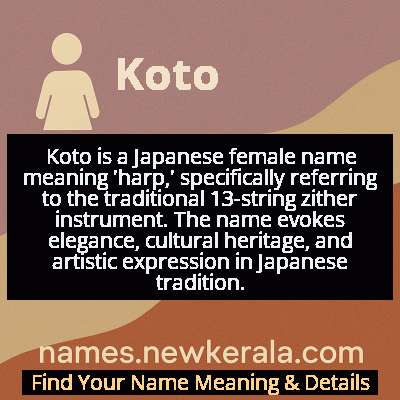Koto Name Meaning & Details
Origin, Popularity, Numerology Analysis & Name Meaning of Koto
Discover the origin, meaning, and cultural significance of the name KOTO. Delve into its historical roots and explore the lasting impact it has had on communities and traditions.
Name
Koto
Gender
Female
Origin
Japanese
Lucky Number
7
Meaning of the Name - Koto
Koto is a Japanese female name meaning 'harp,' specifically referring to the traditional 13-string zither instrument. The name evokes elegance, cultural heritage, and artistic expression in Japanese tradition.
Koto - Complete Numerology Analysis
Your Numerology Number
Based on Pythagorean Numerology System
Ruling Planet
Neptune (Ketu)
Positive Nature
Intuitive, analytical, spiritual, and inquisitive.
Negative Traits
Secretive, reserved, aloof, and can be overly critical.
Lucky Colours
Green, yellow.
Lucky Days
Monday.
Lucky Stones
Cat’s eye, moonstone.
Harmony Numbers
1, 5, 6.
Best Suited Professions
Scientists, researchers, spiritual leaders, detectives.
What People Like About You
Depth of knowledge, analytical skills, spirituality.
Famous People Named Koto
Koto Matsudaira
Diplomat
Japanese diplomat who served as Permanent Representative to the United Nations
Koto Bolofo
Photographer
South African-born photographer known for fashion and documentary photography
Koto Ishihara
Musician
Traditional koto performer and teacher preserving Japanese musical heritage
Name Variations & International Equivalents
Click on blue names to explore their detailed meanings. Gray names with will be available soon.
Cultural & Historical Significance
Throughout history, koto music has been integral to gagaku (court music) and later developed into solo and ensemble forms that remain vital to traditional Japanese performing arts today. The name thus carries connotations of cultural preservation, artistic excellence, and connection to Japan's aristocratic heritage. In modern times, the koto continues to represent Japan's living cultural traditions, bridging historical practices with contemporary artistic expression.
Extended Personality Analysis
Individuals named Koto are often perceived as graceful, artistic, and deeply connected to tradition while maintaining a modern sensibility. They typically exhibit refined manners, patience, and attention to detail—qualities essential for mastering the actual koto instrument. Their personality often reflects the instrument's characteristics: capable of producing both delicate, subtle tones and powerful, resonant sounds when needed. Kotos tend to be introspective and thoughtful, with a strong aesthetic sense and appreciation for beauty in all forms.
They often possess natural musical or artistic talents and demonstrate remarkable dedication to their crafts. While they value harmony and tradition, they're not rigid traditionalists—rather, they understand how to adapt timeless principles to contemporary contexts. Their calm exterior often masks deep emotional sensitivity and creative intensity, much like the koto's ability to convey profound emotion through its strings. This combination of traditional values and modern adaptability makes them particularly effective in creative fields and cultural preservation efforts.
Modern Usage & Popularity
In contemporary Japan, Koto remains an uncommon but culturally significant given name, primarily chosen for girls by parents who value traditional arts and cultural heritage. While not among the most popular names, it maintains steady usage among families with artistic backgrounds or those seeking names with deep cultural resonance. The name has seen occasional international adoption, particularly by parents interested in Japanese culture or musical traditions. In recent years, there's been a mild resurgence of interest in traditional Japanese names, though Koto remains relatively rare compared to more mainstream choices. Its usage reflects a deliberate choice to honor cultural traditions rather than following naming trends, often selected by parents who want their daughters to embody elegance, cultural awareness, and artistic sensitivity.
Symbolic & Spiritual Meanings
Symbolically, the name Koto represents harmony, cultural continuity, and the beauty of tradition. Like the instrument itself, the name suggests the ability to create beauty through discipline and practice, symbolizing how individual effort can produce collective cultural wealth. The koto's strings represent the interconnectedness of different aspects of life and culture, while its resonating body symbolizes the capacity to amplify and share artistic expression. Metaphorically, the name embodies the concept of 'ma' (negative space or pause) in Japanese aesthetics—the understanding that silence and space are as important as sound in creating meaningful art. It also represents adaptability, as the koto has evolved while maintaining its essential character across centuries, much like how individuals must balance tradition with innovation in their personal growth.

